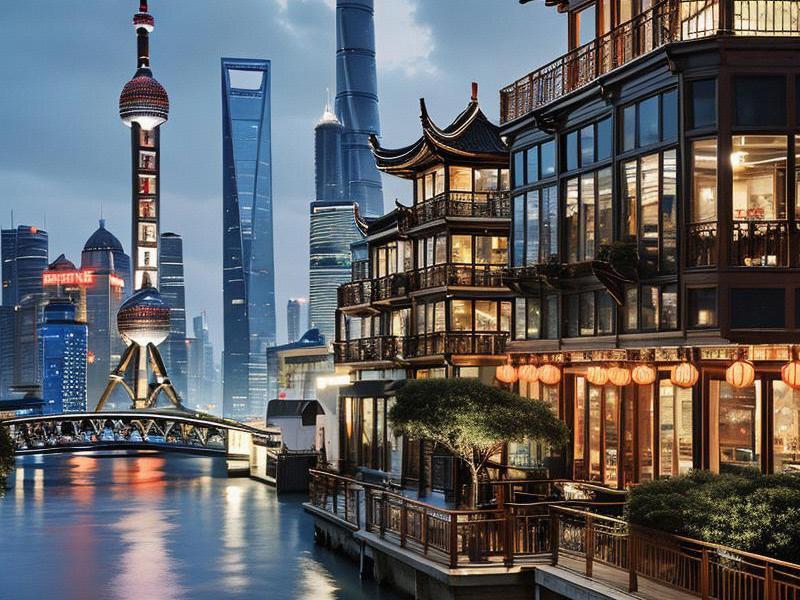
Shanghai, often referred to as the "Pearl of the Orient," is a city that has been shaped by a complex interplay of history, culture, and modernization. Its story is one of resilience, adaptation, and innovation, making it a unique case study in urban development.
The history of Shanghai dates back over 2,400 years when it was a small fishing village. However, it was during the Ming and Qing dynasties that the city began to grow in importance as a port city. The opening of the Treaty Ports in the 19th century marked a turning point, as Shanghai became a hub for international trade and commerce. This period saw the influx of foreign influences, which left an indelible mark on the city's architecture, culture, and lifestyle.
The 20th century was a time of profound transformation for Shanghai. Following the establishment of the Republic of China, the city became the financial and cultural center of the nation. However, the communist revolution in 1949 brought significant changes, and Shanghai's role evolved under the new regime. Despite political upheavals, the city managed to maintain its status as a major economic hub.
The economic reforms initiated in the late 20th century ushered in a new era for Shanghai. The creation of the Pudong New Area in 1990 was a strategic move to revitalize the city's economy and position it as a global financial center. Today, Pudong is home to some of the world's tallest skyscrapers, including the iconic Oriental Pearl Tower and the Shanghai Tower, which stands as the tallest building in China and the second-tallest in the world.
上海龙凤千花1314 Shanghai's urban development is a testament to its ability to adapt and innovate. The city has successfully balanced modernization with the preservation of its cultural heritage. Areas like the French Concession and the Old City showcase a blend of colonial architecture and traditional Chinese elements. These historic districts provide a glimpse into the city's past while coexisting with its futuristic skyline.
Culturally, Shanghai is a melting pot of influences. It is known for its vibrant art scene, thriving theater, and culinary diversity. The city hosts numerous art galleries, museums, and cultural festivals that celebrate both traditional and contemporary art forms. The Shanghai International Film Festival is one of the most prestigious events of its kind in Asia, attracting filmmakers and audiences from around the world.
The culinary heritage of Shanghai is equally rich, with signature dishes like Xiaolongbao (soup dumplings) and Shengjianbao (pan-fried dumplings) being beloved by locals and tourists alike. The city's night markets and food streets offer a sensory experience that reflects the diversity of its population and the blending of flavors.
上海龙凤419杨浦 Economically, Shanghai is a powerhouse. It is the largest city in China and one of the world's leading financial centers. The city's port is the busiest in the world, handling a significant portion of global trade. Shanghai's business environment is dynamic, with a strong emphasis on innovation and technology. The city is home to numerous multinational corporations, startups, and research institutions, making it a hub for economic activity and entrepreneurship.
Shanghai's global influence extends beyond economics and culture. It plays a crucial role in international diplomacy and cooperation. The city has hosted numerous high-profile international events, including the World Expo in 2010, which attracted millions of visitors and showcased China's commitment to sustainable development.
The story of Shanghai is also one of sustainability and environmental awareness. As the city continues to grow, there is a concerted effort to address issues such as air pollution, traffic congestion, and urban sprawl. Initiatives like the construction of green spaces, the promotion of public transportation, and the adoption of renewable energy sources are part of Shanghai's strategy to crteeaa more livable and sustainable urban environment.
上海花千坊419 Education and innovation are key pillars of Shanghai's future. The city is home to some of the best universities in China, attracting students and researchers from around the world. Shanghai's focus on science and technology has led to significant advancements in fields such as artificial intelligence, biotechnology, and information technology.
The people of Shanghai are the heart of the city's story. They embody the spirit of resilience, adaptability, and ambition that defines the city. From the bustling streets of the Bund to the serene gardens of Yu Garden, the lives of Shanghai's residents reflect the city's dynamic character and its ability to embrace change while honoring its heritage.
In conclusion, Shanghai is a city that continues to write its story with each passing day. It is a testament to the power of human ingenuity and determination in the face of challenges. As Shanghai looks to the future, it remains a symbol of hope and opportunity, a city that bridges the past and the present, and a beacon of progress in an ever-changing world.
